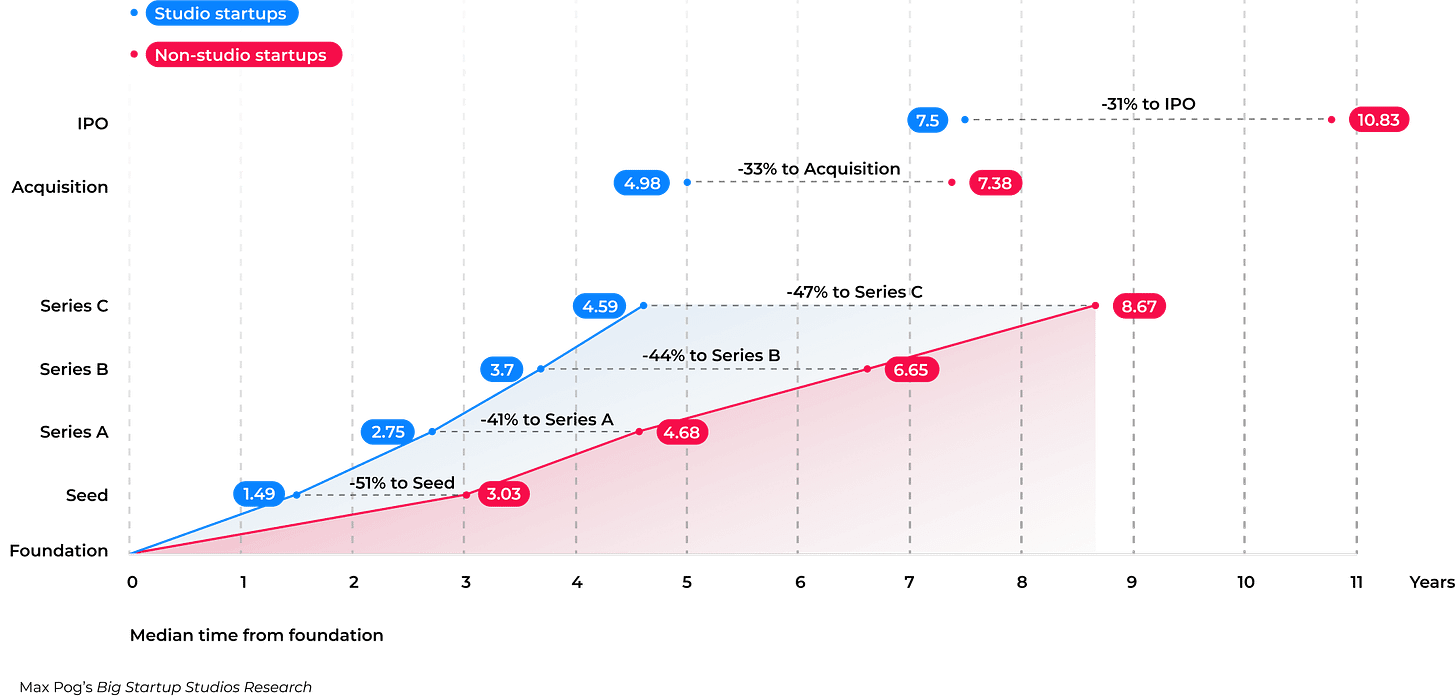The first time I heard about “venture studios” was during a late-night conversation at INNOV’NIGHT. I was talking with Guerric, the co-founder of Hublo, and Delphine, who oversees entrepreneurship and innovation programs at Institut Polytechnique de Paris.
This was during a coffee break at 2 a.m. in the lobby during an intense hackathon organized by Telecom Paris and Institut Polytechnique de Paris. Over 100 students were tasked with creating a startup from scratch, building it overnight, and pitching it by morning. I was there as a coach and staff member, helping teams through their ideation process.
Guerric and Delphine were discussing “Venture Studios” in connection with the ecosystem they’re building for Deep Tech startups at Polytechnique’s research center. I listened intently, intrigued by the concept, and realized how different it was from traditional incubators and accelerators. Here’s What I learned and why I believe venture studios represent the future of startup creation.
Why are Venture Studios the future of startup creation?
What is a venture studio?
A venture studio is like an incubator company, but instead of just nurturing external ideas, it builds startups from within, covering everything from idea generation to customer acquisition.
Unlike traditional incubators, venture studios don’t just provide resources; they actively participate in building the startup. They bring ideas from their extensive networks-comprising entrepreneurs, VCs and corporate partners-then recruit top talent to lead each venture, provide funding, and create a minimum viable product (MVP). This is a hands-on, iterative approach that allows studios to test and pivot quickly.
The Venture Studio Framework
Ideation: Studios leverage their network and expertise to identify market needs and develop innovative concepts
Validation: Ideas are rigorously tested through proof-of-concept (PoC) development and initial user feedback
Team Building: Experienced entrepreneurs are recruited to lead the most promising ventures
Launch and Growth: The studio provides ongoing support, resources, and funding to accelerate the startup’s growth
Key Elements of Venture Studios
A team of seasoned partners, often serial entrepreneurs, who oversee each stage of development.
In-house analyses for identifying opportunities.
A comprehensive back-office team covering product development, marketing, finance, legal, and operations.
A dedicated recruitment team for founder placements.
Access to a network of experts for strategic guidance.
Financial support from the sed stage through Serier A
Venture Studios are effectively “startup factories” where every aspect of startup development is consolidated under one roof. This model mitigates initial risks, with studios often holding over 30% of the equity.
Advantages of venture studios
1. Speed and Agility
Venture studios are designed for rapid growth and quick pivots, allowing startups to progress faster than those in traditional models. With direct access to funding and industry connections, studios can expedite both initial funding and exit timelines.
Source: Max Pog’s Big Startup Studios Research
2. Higher Success Rates
According to the Global Startup Studio Network (GSSN), only 9% of venture studio startups fail, a dramatically lower rate than traditional startups. This is due to structured support, resources, and constant iteration.
3. Access to High-Quality Talent
Studios attract top-tier talent by offering roles in multiple innovative projects. This approach brings experienced, risk-tolerant entrepreneurs and skilled specialists into the ecosystem, fueling continuous innovation.
4. Collaborative Ecosystem
Venture studios foster a collaborative environment where startup teams interact, share ideas, and form strategic partnerships. This knowledge-sharing environment boosts synergies and accelerates growth opportunities.
Venture studios create a collaborative environment where start-ups can interact, share ideas, and collaborate with other entrepreneurs.
5. Founder-Friendly
Venture Studios are ideal for experienced entrepreneurs who want to create new products without shouldering the initial risks of a startup alone. Studios identify market needs, develop products, and find initial customers, making it easier for founders to focus on scaling and product development.
6. Return on Investment (ROI)
GSSN data show venture studios hold between 15% to 80% of initial startup equity, averaging around 34%. Founders typically retain about 50% of equity, with the remainder going toward employee stock options. This model provides an average internal rate of return (IRR) of 53%, compared to 21.3% for traditional startups.
By consolidating all stages of development, venture studios are revolutionizing the startup model, providing founders and investors alike with a structured, high-potential pathway for innovation and growth.
If you’re interested in diving deeper into the venture studio model, I highly recommend checking out Max Pog's detailed article on the subject.





